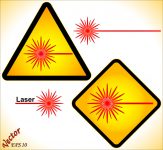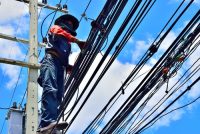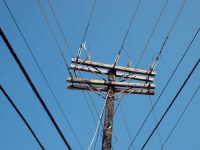Category: Electrical Safety
Electrical hazards can cause burns, shocks and electrocution (death). OSHA’s design safety electrical standards apply to systems that provide power and light to employee workplaces. These regulations cover electrical installations and equipment installed or used within or on buildings, structures, and other premises. OSHA’s safe work practice rules for electricity provide standards for both qualified employees (those with a specific level of training) and unqualified employees (those with little or no training) who work on, near, or with various electrical components.
In October 2014, OSHA reinspected Wood Fibers, Inc., a wood pellet manufacturing facility in Niagara, Wisconsin, for the fifth time in 3 years. The employer had been cited for serious hazards in 2012, but late last year, conditions had not improved much. Wood Fibers was cited for four repeat and eight serious violations, including serious […]
Sometimes, you need an electrical cord that bends a little. Maybe it’s because you have to use your power drill or saw in many different locations during the workday. Maybe it’s because a piece of machinery vibrates when it’s operating and you don’t want to transfer that vibration throughout your electrical system. Or, maybe it’s […]
Lasers—intense, focused beams of nonionizing radiation—are in widespread use today. You can buy a laser pointer at your local drugstore to draw attention to your upcoming presentation. Bar-code scanners in retail cash registers use lasers to automatically retrieve the purchase price of consumer goods. Laser surgery clears our vision. We can use laser guidance and […]
On January 5, OSHA announced the renewal of an alliance with the Laser Institute of America (LIA) to protect workers from exposure to beam and nonbeam lasers in industrial, construction, medical, and research workplaces. The word “laser” stands for “Light Amplification by Stimulated Emission of Radiation.” Lasers are cavities that are filled with crystal, liquid, […]
A 20-year-old employee at a manufacturer of rice cakes and other snack products was shocked while performing service work on an electrical panel on August 18, 2014. The employee missed 2 days of work. After hearing of the injury, OSHA inspected the facility and identified several problems with the employer’s electrical safety work practices.
Electrical utility workers are not the only ones who could be exposed to the hazards of overhead power lines. Any outdoor worker may be exposed to power line hazards. Yesterday, we covered four questions that all outdoor workers should ask if there are power lines near their work area. Today, we’ll cover two more.
Exposure to overhead power line hazards is not limited to employees of electrical utilities—workers in industries like construction and agriculture can also be exposed to them. If workers could violate the required clearances around the power lines, make sure they’re informed about the power lines and the work practices that are required to keep […]
May is National Electrical Safety Training Month, which makes it a good time to review your electrical safety training program. Today’s Advisor gives you a refresher on the requirements for each employee group. The Occupational Safety and Health Administration (OSHA) delineates the different types of employees who work with or around electricity and what their […]
Arc flash incidents can be deadly. Make sure your employees know safe work practices.
The more your workers know about arc flash hazards and precautions, the safer they will be.










